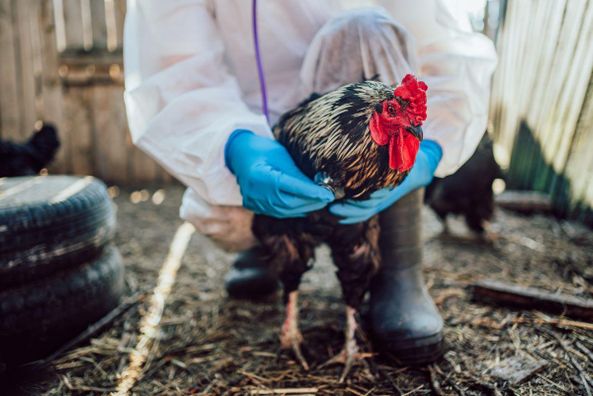Bird flu, or avian influenza, is a rare viral infection that mostly affects birds but can, in some cases, infect humans. Recently, the H5N1 strain has made headlines, with 67 reported cases in humans across the U.S. as of January 22, 2025. While the risk to public health remains low, staying informed about bird flu symptoms and prevention can help you stay prepared and protect your health. Here’s what you need to know.
What is Bird Flu?
Bird flu, a type of avian influenza, is a viral infection caused by the H5N1 strain of the influenza virus. This virus is primarily found in and hosted by wild water birds across the globe, such as ducks, geese, and swans.
Bird flu spreads through contact with the mucus, saliva, or droppings of infected birds. The good news? Human-to-human transmission is extremely rare, making it less likely to spread from person to person.
How Does Bird Flu Spread to Humans?
While bird flu rarely spreads to humans, it can occur through direct, unprotected contact with infected birds, animals, or their environments. Transmission can also happen when a person handles surfaces or equipment that have been contaminated with infected mucus, saliva, or feces. Poultry workers, farmers, dairy workers, and people with bird flocks or other wild animals are at a higher risk of contracting bird flu.
It’s important to know that so far, no cases of person-to-person transmission of bird flu have been reported in the United States.
Also read: Tips for Deep Cleaning After You’ve Been Sick
Bird Flu Symptoms in Human
Bird flu symptoms can range from mild to severe, depending on the individual and the severity of the infection.
Mild bird flu symptoms may include:
- Body aches
- Cough
- Eye redness or irritation
- Fatigue and tiredness
- Fever
- Headaches
- Sore throat
In more severe cases, symptoms can progress to:
- Altered consciousness
- High fever
- Seizures
- Shortness of breath
Bird flu can lead to serious health complications if left untreated. These may include respiratory failure, kidney failure, pneumonia, sepsis, inflammation of the brain, or even multi-organ failure. Without timely medical care, these conditions can become life-threatening.
If you are feeling sick and need support managing your symptoms, contact your primary care provider or visit a Duly Health and Care Immediate Care Center to learn about testing and treatment options for any virus.
Is There a Vaccine for Bird Flu?
There is a vaccine for certain strains of bird flu today, but it is not widely available for the general public. With the emergence of new H5N1 strains, scientists are working to update the vaccine to ensure its effectiveness against the current strains.
Moderna is currently developing an mRNA vaccine for H5N1 bird flu virus. While the vaccine is still in early development, the mRNA technology allows for faster adaptation if new strains of the virus emerge. This approach could lead to quicker distribution and faster response times during outbreaks, providing a more efficient way to protect public health.
Bird Flu and Food Safety
Food safety is always essential, especially with the H5N1 bird flu strain impacting birds and cattle. While there is currently no evidence that bird flu can spread to humans through properly handled and cooked eggs or pasteurized milk, following safe practices is key to protecting your health.
- Egg Safety: Store eggs in the refrigerator at 40°F or below and cook them thoroughly to an internal temperature of 165°F to eliminate any potential risks.
- Milk Safety: Pasteurized milk is safe to drink, as the pasteurization process destroys harmful viruses and bacteria. Raw milk is a different story — it can carry not only the bird flu virus but also other dangerous bacteria, such as Salmonella and E. coli. For your safety, it’s strongly advised to avoid consuming raw milk.
By taking these precautions, you can enjoy your food with peace of mind while minimizing risks to your health.
Bird Flu in Cats, Dogs, and Other Mammals
Though rare, cats and dogs can contract bird flu. To protect your pets, avoid feeding them raw meat or milk, as these may carry the virus. In several states, cats have died from the consumption of raw milk contaminated with bird flu. It’s also recommended to keep pets indoors when possible and prevent them from chasing wild birds outdoors.
Dairy cattle are also at risk of infection, making it especially important to choose properly handled and pasteurized dairy products. Pasteurization eliminates harmful bacteria and viruses, ensuring that milk and other dairy items are safe to enjoy.
Prevention Tips for Bird Flu
While the risk of bird flu to humans is currently low, it’s still important to take simple precautions to protect yourself and your family. Here are some helpful prevention tips:
- Avoid contact with sick or dead animals
- Steer clear of bird droppings or surfaces contaminated with bird mucus, saliva, or feces.
- Refrain from consuming raw eggs or raw milk
Taking these simple steps can help minimize your risk of exposure to bird flu.
Staying informed is also essential. Keep an eye on updates from trusted health authorities like the Centers for Disease Control and Prevention (CDC) and the Illinois Department of Public Health (IDPH) to ensure you’re prepared to take timely and appropriate action. A proactive approach can help protect both you and your community from the bird flu.
Health Topics:



